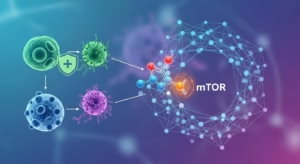Is Rapamycin an Effective Longevity Drug?

Rapamycin and Its Potential in Extending Human Lifespan
Rapamycin was originally developed as an immunosuppressant to prevent organ transplant rejection and its potential applications in extending the human lifespan. Rapamycin is a geroprotective drug, that is not necessarily to benefit in one aspect, i.e. a chronic disease, but is fundamentally altering the biology of aging. Recent studies have highlighted its potential as a longevity-enhancing drug, especially in animal models.
Rapamycin’s primary mechanism of action involves the inhibition of the mTOR pathway (mechanistic target of rapamycin), which is critical in regulating cell growth, protein synthesis, metabolism, and aging. This pathway has been extensively studied in the context of aging biology. By suppressing mTOR activity, rapamycin may reduce cellular stress, delay the onset of age-related diseases, and promote a longer lifespan.
Animal studies in which rapamycin has been shown to increase the lifespan of organisms such as mice, worms, and fruit flies, sometimes by significant margins. These results have generated excitement in the scientific community about the possibility of using rapamycin as an anti-aging intervention in humans.
Implications and Risks
In addition to potential life extension, rapamycin may improve health span—the period of life spent in good health—by mitigating conditions associated with aging, such as neurodegenerative diseases, cardiovascular issues, and metabolic disorders. Some early-stage human studies and anecdotal reports suggest improvements in markers of aging, but these findings remain preliminary.

Since the drug suppresses immune function, prolonged use could make individuals more susceptible to infections and other complications. The optimal dosage and treatment protocols for using rapamycin in a longevity context are not yet established. The lack of large-scale human trials further limits the understanding of its long-term safety and efficacy. While animal research provides valuable insights, translating these findings to humans involves significant complexity due to differences in physiology and lifespan.
Conclusion
Rapamycin as a drug with remarkable potential for influencing the aging process and extending lifespan. It balances optimism with a cautious acknowledgment of the unanswered questions surrounding its use in humans. Continued investment in research to unlock the full potential of rapamycin and other interventions targeting aging mechanisms is vital, to position Rapamycin as a promising avenue in the quest for healthier and longer lives.
For viewers interested in the science of longevity, Peter Attia MD’s video provides an insightful and well-rounded exploration of rapamycin’s possibilities and limitations.



